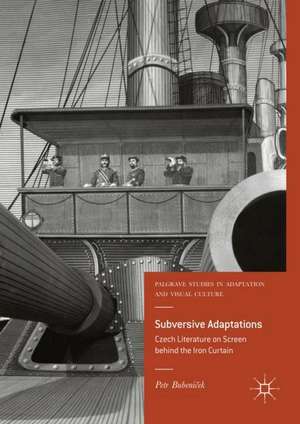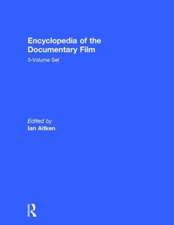Subversive Adaptations: Czech Literature on Screen behind the Iron Curtain: Palgrave Studies in Adaptation and Visual Culture
Autor Petr Bubeníčeken Limba Engleză Hardback – 20 noi 2017
This book deals with film adaptations of literary works created in Communist Czechoslovakia between 1954 and 1969, such as The Fabulous World of Jules Verne (Zeman 1958), Marketa Lazarová (Vláčil 1967), and The Joke (Jireš 1969). Bubeníček treats a historically significant period around which myths and misinformation have arisen. The book is broad in scope and examines aesthetic, political, social, and cultural issues. It sets out to disprove the notion that the state-controlled film industry behind the Iron Curtain produced only aesthetically uniform works pandering to official ideology. Bubeníček’s main aim is to show how the political situation of Communist Czechoslovakia moulded the film adaptations created there, but also how these same works, in turn, shaped the sociocultural conditions of the 1950s and the 1960s.
| Toate formatele și edițiile | Preț | Express |
|---|---|---|
| Paperback (1) | 410.32 lei 38-44 zile | |
| Springer International Publishing – 23 aug 2018 | 410.32 lei 38-44 zile | |
| Hardback (1) | 644.63 lei 43-57 zile | |
| Springer International Publishing – 20 noi 2017 | 644.63 lei 43-57 zile |
Din seria Palgrave Studies in Adaptation and Visual Culture
-
 Preț: 179.31 lei
Preț: 179.31 lei - 20%
 Preț: 816.29 lei
Preț: 816.29 lei - 20%
 Preț: 753.24 lei
Preț: 753.24 lei - 18%
 Preț: 774.83 lei
Preț: 774.83 lei - 15%
 Preț: 638.11 lei
Preț: 638.11 lei - 15%
 Preț: 706.16 lei
Preț: 706.16 lei - 15%
 Preț: 498.94 lei
Preț: 498.94 lei - 15%
 Preț: 577.40 lei
Preț: 577.40 lei - 18%
 Preț: 943.57 lei
Preț: 943.57 lei - 18%
 Preț: 728.43 lei
Preț: 728.43 lei -
 Preț: 385.08 lei
Preț: 385.08 lei - 15%
 Preț: 694.37 lei
Preț: 694.37 lei - 18%
 Preț: 783.98 lei
Preț: 783.98 lei - 18%
 Preț: 893.40 lei
Preț: 893.40 lei -
 Preț: 382.36 lei
Preț: 382.36 lei - 18%
 Preț: 944.51 lei
Preț: 944.51 lei - 18%
 Preț: 727.48 lei
Preț: 727.48 lei - 15%
 Preț: 578.55 lei
Preț: 578.55 lei - 15%
 Preț: 586.23 lei
Preț: 586.23 lei - 15%
 Preț: 701.90 lei
Preț: 701.90 lei - 15%
 Preț: 580.49 lei
Preț: 580.49 lei - 18%
 Preț: 733.65 lei
Preț: 733.65 lei -
 Preț: 424.12 lei
Preț: 424.12 lei - 18%
 Preț: 1115.63 lei
Preț: 1115.63 lei - 15%
 Preț: 637.46 lei
Preț: 637.46 lei - 15%
 Preț: 699.77 lei
Preț: 699.77 lei -
 Preț: 452.62 lei
Preț: 452.62 lei - 18%
 Preț: 784.30 lei
Preț: 784.30 lei - 15%
 Preț: 704.69 lei
Preț: 704.69 lei - 18%
 Preț: 893.71 lei
Preț: 893.71 lei - 18%
 Preț: 952.09 lei
Preț: 952.09 lei - 15%
 Preț: 701.90 lei
Preț: 701.90 lei
Preț: 644.63 lei
Preț vechi: 758.38 lei
-15% Nou
Puncte Express: 967
Preț estimativ în valută:
123.35€ • 129.11$ • 102.67£
123.35€ • 129.11$ • 102.67£
Carte tipărită la comandă
Livrare economică 31 martie-14 aprilie
Preluare comenzi: 021 569.72.76
Specificații
ISBN-13: 9783319409603
ISBN-10: 3319409603
Pagini: 223
Ilustrații: XI, 224 p. 10 illus.
Dimensiuni: 148 x 210 x 21 mm
Greutate: 0.54 kg
Ediția:1st ed. 2017
Editura: Springer International Publishing
Colecția Palgrave Macmillan
Seria Palgrave Studies in Adaptation and Visual Culture
Locul publicării:Cham, Switzerland
ISBN-10: 3319409603
Pagini: 223
Ilustrații: XI, 224 p. 10 illus.
Dimensiuni: 148 x 210 x 21 mm
Greutate: 0.54 kg
Ediția:1st ed. 2017
Editura: Springer International Publishing
Colecția Palgrave Macmillan
Seria Palgrave Studies in Adaptation and Visual Culture
Locul publicării:Cham, Switzerland
Cuprins
1. Introduction.- 2. Adaptation as Subterfuge: Silvery Wind.- 3. Adaptation as Play: The Worlds of Jules Verne Come Alive.- 4. Adaptation as Challenge: Marketa Lazarová and Romance for Bugle.- 5. Adaptation as a Reflection of the Zeitgeist.- 6. Epilogue.
Recenzii
“Bubeníček’s study is a remarkable historian’s project, as his introduction focuses on offering a nuanced overview of social thought between 1948 and 1969. … Bubeníček’s entire volume is, indeed, structured this way. Its great merit lies in the broad, well-documented historical overview it proposes, combined with the masterly interpretation of both literary and cinematic techniques.” (Maria Chiorean, Metacritic Journal for Comparative Studies and Theory, Vol. 5 (1), July, 2019)
“Throughout this tour of post-war Czech cinema, Bubeníček is an urbane, perceptive, and exceptionally well-informed guide. He is a rewardingly subtle analyst of his country’s political history, its literary and cinematic landmarks, and especially the visual and auditory texture of the films in which he takes such contagious delight. … Bubeníček’s expositions are as illuminating as they are thorough … .” (Thomas Leitch, Adaptation, Vol. 11 (03), 2018)
Notă biografică
Petr Bubeníček is Assistant Professor in the Department of Czech Literature and Library Studies at Masaryk University, Czech Republic. He specializes in the history of modern Czech literature, literary interpretation, film adaptation, and intermediality. He has published several studies, in addition to editing three issues on film adaptation for the journals Česká literatura, Iluminace, and Pandora.
Textul de pe ultima copertă
This book deals with film adaptations of literary works created in Communist Czechoslovakia between 1954 and 1969, such as The Fabulous World of Jules Verne (Zeman 1958), Marketa Lazarová (Vláčil 1967), and The Joke (Jireš 1969). Bubeníček treats a historically significant period around which myths and misinformation have arisen. The book is broad in scope and examines aesthetic, political, social, and cultural issues. It sets out to disprove the notion that the state-controlled film industry behind the Iron Curtain produced only aesthetically uniform works pandering to official ideology. Bubeníček’s main aim is to show how the political situation of Communist Czechoslovakia moulded the film adaptations created there, but also how these same works, in turn, shaped the sociocultural conditions of the 1950s and the 1960s.
Caracteristici
First book-length study of Czech literary film adaptation in English Looks at a historically significant period about which little is known Disproves the notion that state-controlled film industry behind the Iron Curtain produced only works pandering to official ideology Takes a rare look at adaptation studies beyond traditional Anglophone cultures Includes supplementary material: sn.pub/extras








